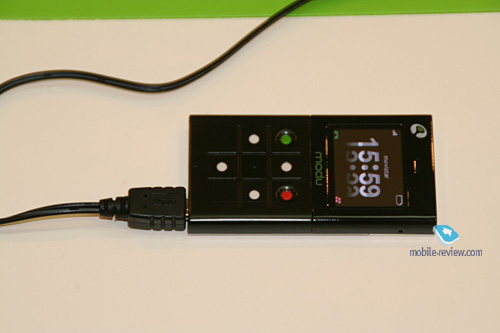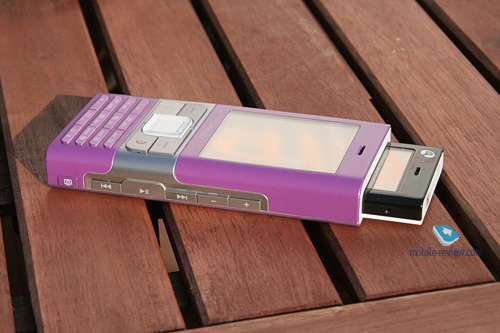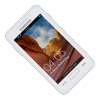Spillikins є130. Modular devices Ц The Future or Indie?
Yet another week I spend in airports with little time for web browsing but plenty of interesting encounters. I will share some of my experiences with you right now and some I will leave for a while. This summer is surely promising some hot times for cell phone manufacturers and I mean it. What is happening right now is no less than an era shift Ц I feel lucky to be witnessing such this lot of interesting events and it will be the Chinese companies that will benefit the most from all these market perturbations, but I will leave this topic for some time later. As for now, let us consider a new type of gadgets.
Contents:
- An African adventure or The New Gadget Concept
- IDC research. Sales of leading phones manufacturers
- 3G Hacked? I Have Doubts
- Apple Has More Cash Than the US Government
An African adventure or The New Gadget Concept
My business trip took me through six African countries last week: a business jet, a nice company of phone developers and fascinating places. All we talked about were future concepts which were the reason of the whole thing. They did not ask me to sign an NDA, moreover, we have agreed on me reviewing on of the concepts in the Spillikins which I am going to do soon.
What we have here is a major company with vast R&D spendings specializing in computer parts (memory, CPUs, architecture solutions) and consumer electronics (notebooks, tablets, cell phones). Until recently this company has been following the market and did not try to create a new class of devices, it worked with existing technologies and solutions. Unlike Intel this company did not try to set new standards but merely produced nice hardware. But starting from 2012-2013 the company is planning on revising their strategy and seeking new market niches for new technologies and new device concepts. I want to tell you about one of these concepts today.
Imagine a phone that would incorporate all the latest technologies and be one year ahead of the market. Except for the moral design ageing such a phone could be up to date for 2-3 years. During this time it would not become technologically obsolete in terms of the performance, screen and software (implying it would be timely updated). Let's assume that such a phone already exists, let's call Super Phone 2 or SP2 shortly (a fictitious name, of course, any similarities are coincidental). This phone already has a successor Ц Super Phone 3 that features all thinkable technologies Ц an engineering masterpiece which will become the platform for the future concept devices. Except for the design, the screen and a number of minor improvements there isn't really much a manufacturer can do to impress the buyers. The Super Phone 4 would be popular but it would not be that much more advanced as compared to its predecessors in terms of technology Ц it would have more cores, better performance etc. But the company believes that a mere quantitative growth would not interest the consumers so they want to create something new Ц a game changer.
The working name of this game changer is "three-in-one". I have had a chance to try out its prototypes and I found them impressive. I must add that these devices might go on sale late 2012 or early 2014 at best. This concept is only being born. Its idea is obvious and it has already been tried by several manufacturers but I think this "three-in-one" concept just might be the real thing.
The Modu modular phones that failed commercially were forerunners of this concept. The idea was brilliant Ц there is the main module that contains the phone itself and a battery and there are various jackets for it that add certain features like key pad, camera etc. So you could buy a phone and then extend its features by buying inexpensive jackets. Unfortunately, Modu failed to succeed with this concept. Alas, I liked the idea but the application of it was disappointing.



Another solution that uses a modular design is Motorola Atrix 4G and the laptop module to connect your phone to. The phone in this case is the processing unit while the laptop only consists of the screen, keyboard, battery and the interfaces. Currently, when you connect the phone to the laptop you are still using same Android OS except for the browser that switches to its desktop version. You get to keep all your contacts and data in one place Ц the phone becomes the main part of such a laptop but you can only use the OS the phone is running on.

Now back to the "three-in-one" concept. As you might know the hardware of a modern tablet is almost identical to the hardware of top phones. The difference is in the battery capacity, body, the screen and the OS that should be optimized for higher resolutions. Let's now imagine that a buyer of SP4 will be able to but a tablet for just $200 that has no hardware besides the battery and the screen Ц you will simply have to insert your phone into the tablet and get maximum features and a phone charger. The OS would automatically switch to the tablet mode. An identical tablet would have cost you $1000. So a separate phone and a tablet would cost you $2000 while a tablet-phone pair would only cost $1200. If you take into account equal performance it is a no-brainer. I must make a not here that this "three-in-one" concept is not only a technological concept but also a marketing one. The market of such devices will not become massive Ц it will get 5% of the flagship phone buyers at best. And if it does it would be a great success for the first generation of such devices Ц this will be the birth of a completely new market.
There is more into that Ц there is also the third constituent of this concept Ц the keyboard with another battery, a number of interfaces and without a screen. The laptop will use the tablet as the screen. There is an inbuilt platform that has a Windows image (an ARM compatible version). The laptop can run either on the native OS or Windows. You can use both the tablets touchscreen and the keyboard. The keyboard will cost you $200-300. So the full set sums up to $1500.
Is it convenient? Well, not for everyone. If you insert the phone into the tablet you will have to use a Bluetooth or wired headset to make calls and that's not always handy. On the other hand, you get a very cheap low-end laptop. You get a basic netbook for web browsing, documents and casual games. It won't be massively popular Ц it will merely prove that such things can work.
This concept might seem a bit naive but it is the only chance for companies like Sony, HTC, Samsung, Sony Ericsson and Google to fight off Apple's domination on the markets of cell phones and tablets. Apple's share will only be growing and I see no reasons think otherwise. Apple is a threat to Android which is losing the most desired segment of the market Ц the top devices. Android tablets cannot yet compete against iPad. This causes other manufacturers to pursue new concepts like "three-in-one" that might create new market opportunities for them.
I must repeat that this concept may only come to life late 2012, no earlier. However, this is just a idea and we might never see it officially announced or put into practice. This is one of the current working concepts Ц one of many. I must add that all these concepts are self-evident and I am allowed to discuss them. And I think this is a topic worth discussing. I positively like that the "three-in-one" concept from the beginning considers the hardware, the software and the marketing plans and PR.
I invite you to join in the discussion and say what tell what you think: does this concept have a future? Would you buy such a device and why?
Back to the table of contents >>>
IDC research. Sales of leading phones manufacturers
IDC research company published their report featuring sales of leading phones manufacturers. Some figures and reasons for failure have been already discussed in the Spillikins, so just look at the world according to IDC.

In the top 5 only Nokia and LG are losing their share dramatically. They suffered similar losses in sales down 20% in terms of the number of handsets sold. The most active player is Apple, which is the only one to achieve staggering growth of 148% (in top 5). ZTE sales impress too and the company is skyrocketing courtesy of the Asian market.
Where are figures for Motorola and Sony Ericsson? They are too tiny and inconspicuous and suffer as hard as Nokia and LG. The downward spiral takes years until you hit the ground, but it will be painful in the end. These two players already see the outcome on the horizon. You can prolong the agony, but their current management and absence of development make the end inevitable. It's a pity the market will be devoid of the old working horses and I am curious who will take their place.
To some extent the gap will be filled by HTC, which is riding high and turns everything into gold at the moment. In the second quarter the Taiwanese company showed a remarkable growth of 124% for its smartphones (it does not offer simple phones) in comparison with the same quarter a year ago and 25% against the first quarter of the year. The total sales reached 12.1 million handsets.
In fact sales of HTC are fuelled by the interest towards Android and nothing can stop the company apart from patent wars and legal battles. Users like handsets from HTC and its main goal is beating RIM, which managed selling only 13.3 million devices in the second quarter. During the next two quarters HTC will surely overtake the Canadian manufacturer of Blackberry.
During the presentation of the report top managers of the company promised to reveal in the autumn of 2011 the full strategy aimed at offering unique content for the entire HTC lineup. They believe it will distinguish HTC from its rivals.

Now let's mention sales figure for Samsung, which has been keeping its results secret during the last three quarters and gave only general assessments. Subsequently journalists were interested if Samsung has already managed to surpass Nokia in the segment of smartphones or not. All independent reports show figures between 17 and 19.5 million for the second quarter of 2011. It is more than sales of Nokia devices, but is inferior to those of Apple. It looks well for the Korean manufacturer if you remember that in 2010 the share of the smartphone market graced by Samsung models was negligible.
Samsung officially mentioned the new milestone for Samsung Galaxy S2. Within 85 Days the company managed to sell 5 million handsets worldwide, which is a new record for Samsung. During the first 55 days they shipped 3 million. Renewed interest was influenced by sales on new markets. There is a huge room for improvement, because the model is still unavailable in thee US.

To understand the sales figures compare them with total results for Sony Ericsson of 5.3 million handsets. In 90 days Samsung showed the same sales for its flagship model as the whole portfolio of Sony Ericsson. If you want to be even more impressed compare results with those of Motorola, which sold only 4.4 million phones. Undoubtedly Apple beats everybody with 20.3 million items sold (iPhone 4, iPhone 3Gs 8GB). Without cheaper models in the lineup the portfolio of iPhone was always easier to sell.
Back to the table of contents >>>
3G Hacked? I Have Doubts
The rumour that hackers managed to get access to all conversations of Vodafone after hacking 3G/WCDMA standard is a good example how you can misrepresent any information. In the original article about the attack on Vodafone there was not a single word about the hacking of 3G algorithms. Moreover the article mentions that Vodafone compromised the security of its network by sending key information to the femtocell and if hacked it could have given the access to subscribers conversations. Feel the difference. On one hand we have a communication standard, which has not been hacked yet and the hacking of a particular device made vulnerable by Vodafone engineers neglecting the network security. Many journalists decided to disseminate the fact about the "hacking" of the standard. It may be easier to understand the events without much analysis. I advise to read the original article to have a better picture of developments.
Vodafone Hacked - Root Password published
Back to the table of contents >>>
Apple Has More Cash Than the US Government
Turn on any news TV channel and you will be attacked by the information on the forthcoming financial collapse, because of the possible technical default of the USA. Someone even noticed that at the moment Apple has $76.2 billion on its accounts, while the US government has only $73.7 billion. It is impressive and worth mentioning that among high-tech companies Apple is followed by Microsoft ($41 billion) and Cisco ($40.3 billion).
In the podcast Radio-T No 249 we touched upon this fact, but I will repeat it here. What Apple may spend the money on? I do not take into equation acquisitions as it is a different story, but Apple will surely invest into data centres and fibre optic networks. Any company participating in the new economy values not only products, services and software, but instant delivery of data to clients no matter where they are located geographically. Sales of Lion show that Apple is ready even today. More than a million of copies of the new OS were downloaded despite the size of 4 GB. No slow connections were to blame for any delay and all users were limited only by their networks. There is nothing new in it as Microsoft initiated the strategy a long time ago. The key idea is that the speed of connection with users and the quality of services come to the fore now. You cannot become a global company in 2020 without data centres scattered around the world. Not everybody can do it now, but only those who understand the importance of such facilities will determine future market developments. Apple is definitely among those in the know. European carriers are also in the race and for the first time we see the development of powerful Internet capacities able to move the market further. It happens due to standard commercial services.
P.S. Nice week and good luck!
Do you want to talk about this? Please, go to our Forum and let your opinion be known to the author and everybody else.
Back to the table of contents >>>
Related links
Eldar Murtazin (eldar@mobile-review.com)
 Twitter Twitter  Livejournal Livejournal
Translated by Robert Mugattarov (mugattarov@gmail.com)
Published — 05 August 2011
Have something to add?! Write us... eldar@mobile-review.com
|









